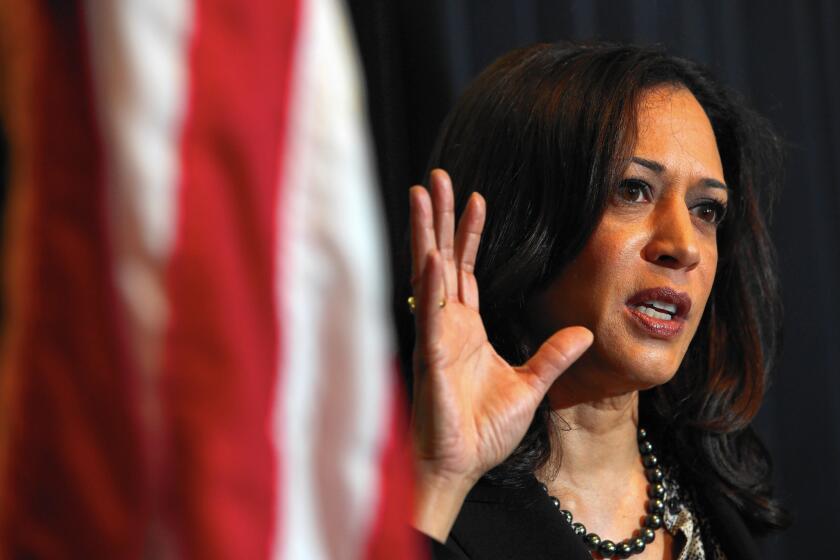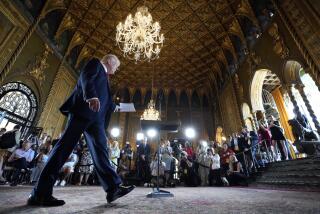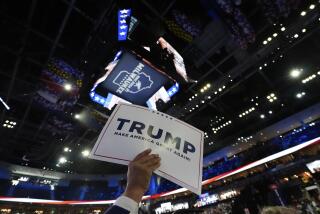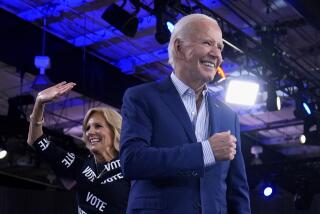Trying for a comeback in final debate with Biden, Trump is a captive of his own information bubble
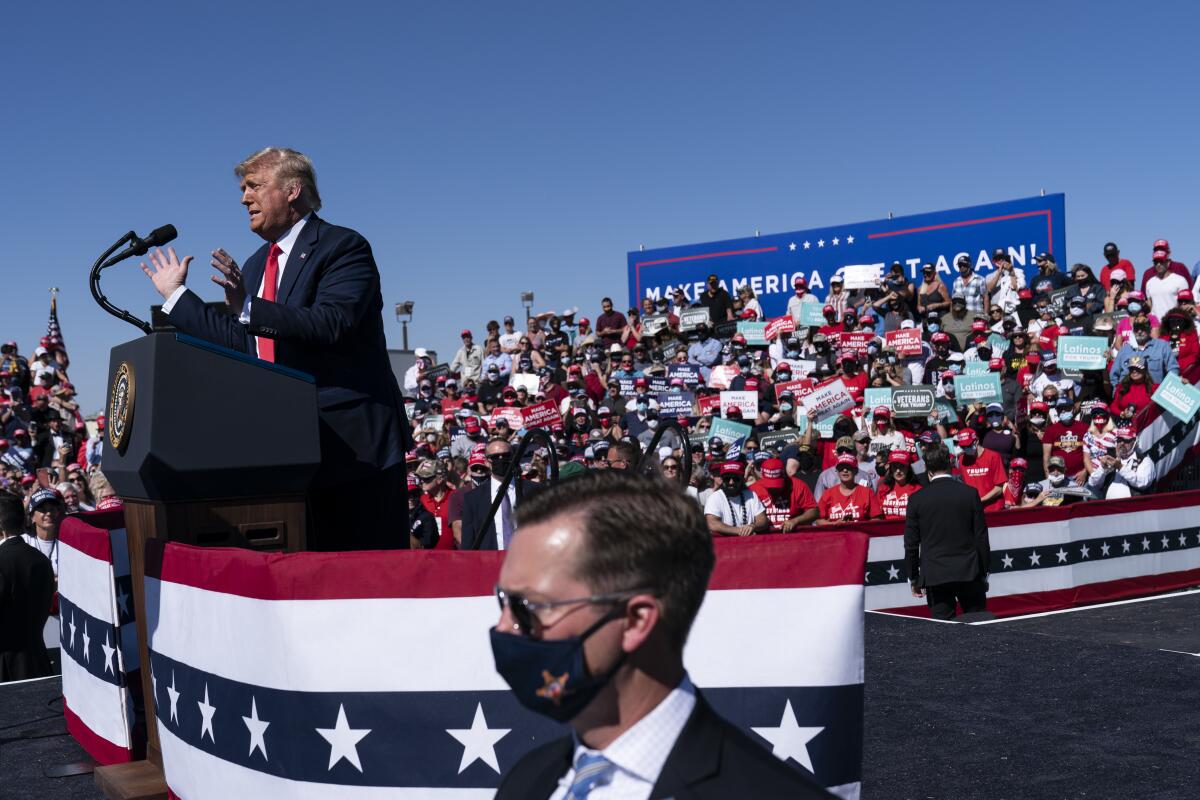
WASHINGTON — President Trump enters his second and final debate with Joe Biden facing a daunting task made vastly more difficult by his own actions.
Trump trails Biden in national polling averages by around 10 percentage points — a more lopsided race than any in a generation. The task of climbing back into contention is made harder by another number: More than 40 million Americans already have voted — likely well over a quarter of the eventual total. Voters who reported having cast their ballots favored Biden 65% to 34% as of the start of this week, according to the USC Dornsife poll’s tracking of the race.
The large number of early voters leaves Trump with a shrinking pool of people to potentially persuade — assuming persuasion is his goal.
With Trump, that’s always been a question. Throughout his presidency, and despite losing the popular vote in 2016, Trump has seemed to believe he can win reelection solely with voters who already support him. That approach has especially shaped his actions during this campaign year, even as a majority of voters consistently tell pollsters they disapprove of how he’s doing his job.
In these closing weeks of the race, Trump has appeared increasingly trapped in the information bubble he has created around himself and his core supporters, relitigating old grievances and attacks rather than addressing issues atop voters’ list of concerns, notably the COVID-19 pandemic.
His 75-minute speech Monday at a rally in Prescott, Ariz., provided vivid examples:
Trump began with several attacks on the “fake news,” segued into reminiscences of his upset win in 2016, then offered a prediction that “the pandemic will soon end; it’s rounding the corner,” followed by musings about writing a book once he’s no longer in office.
He then reignited his quarrel with Dr. Anthony Fauci, the government’s top infectious disease expert; attacked Biden as “gone-zo” and “corrupt”; lit into New York Gov. Andrew Cuomo; and accused Democrats of trying to slow development of a coronavirus vaccine and wanting to “destroy the suburbs.”
All that was before he plunged into an attack on Thursday night’s debate moderator, NBC’s Kristen Welker, calling her “angry” and a “radical Democrat.”
“She’s been screaming questions at me for a long time,” Trump said. “She’s no good, but I figured, what the hell.”
By contrast, on Tuesday night, Biden’s campaign aired a 60-second ad during Game 1 of the World Series that employed optimistic, uplifting images of Americana reminiscent of successful campaigns of incumbents from Ronald Reagan to Barack Obama.
“There is only one America. No Democratic rivers. No Republican mountains. Just this great land and all that’s possible on it with a fresh start,” says the narrator, actor Sam Elliott.
The expensive ad underscored the vast difference between the two sides not only in tone, but in resources. Biden opened October with a $114-million cash advantage over Trump in their main campaign accounts.
Trump’s rally illustrated a core challenge for him, says Sarah Longwell, a Republican strategist and Trump opponent who helped found Republican Voters Against Trump and has conducted focus groups with scores of undecided voters this fall.
President Trump has repeatedly said ‘forest management’ is the key to preventing wildfires. Yet across the West, the government has put on hold millions of acres’ worth of projects aimed at reducing fire risk.
“The problem with the president is the president wants to talk about things that don’t matter to people’s lives,” she said, whether it’s his complaints against the media, his disagreements with Fauci or his suspicions about the overseas business activities of Biden’s son Hunter.
“People’s lives have been upended by the coronavirus,” she said. “They’re looking for substantive answers.” Trump, she said, “only wants to talk about what’s important to him.”
Trump’s parlous position has Republicans increasingly fearful he could swamp the party’s candidates further down the ballot. Democrats have a slightly better than even chance of taking control of the Senate, with victory likely in at least three states and possible in at least four others.
The GOP’s hopes of reducing the Democratic majority in the House have all but vanished; now Democratic gains appear likely. The nonpartisan Cook Political Report revised its House forecast on Wednesday to predict a net Democratic gain of five to 15 seats, largely from suburban districts that have turned against Trump.
“It’s a very challenging environment,” said Republican consultant Alex Conant.
In his 2016 campaign, Trump successfully portrayed his opponents as out of touch with the concerns of the average American. After nearly four years in the White House, that’s now the label his critics have hung on him.
“You watch those rallies. That’s the affirmation that he likes,” said former Sen. Jeff Flake of Arizona, a Republican who has endorsed Biden.
The rally crowds chant about Hunter Biden and Hillary Clinton, Flake said. “They’re not chanting about his coronavirus response or about some differences with Democrats on spending priorities.”
“That’s what he’s created, and that’s what he’s with now,” Flake added. “He’s very much trapped in that bubble.”
California senator has avoided overshadowing her running mate even as Trump and Republicans raise her profile.
Heading into the debate, the defiant mood inside that bubble creates a difficulty for Trump because it reinforces a central part of his temperament — the refusal to admit error or to even suggest he might try a different path.
Campaign strategists in both parties say that at this point, it would be difficult for any single event to change people’s minds about him. “After four years of nonstop coverage, no one is going to suddenly change,” said Conant. “People have made up their minds.”
But to the extent that some movement is possible, the first task would be to erase — or at least soften — the images of the first debate the two candidates had in Cleveland just over three weeks ago.
“Trump did a lot of damage to himself in the first debate,” Longwell said, noting that many of the undecided voters in her focus groups “closed the door to him after that.”
Changing the impression left by the first debate, however, might require Trump to admit he’s open to changing course.
Asked by NBC’s Savannah Guthrie last week at his televised town hall what he would say to win over “people who want to know why they should give you a second chance and how you might improve in a second term,” Trump was unrepentant.
People should support him, he quickly replied, “because I’ve done a great job.”
That, of course, is not how most voters assess his work, especially on the pandemic.
A new Monmouth University poll of voters in Iowa, a state Trump carried handily in 2016, but where he narrowly trails now, found widespread concern about the virus, especially among voters 65 and older. More than 6 in 10 senior citizens in the poll said they worried a lot about the virus, and by 54% to 31%, they preferred that Biden handle it. Biden’s widening margin among seniors in Iowa accounted for most of his lead in the state, the poll found.
But of all the issues facing him, the coronavirus response is the one Trump seems most resistant to addressing.
“People are tired of COVID,” Trump said Monday in Prescott. “You turn on CNN, that’s all they talk about: COVID, COVID, pandemic, COVID, COVID, COVID.”
Experts warn of pandemic fatigue and complacency with the approaching holidays, which have the potential to be super-spreading events.
That sentiment reflects the widespread agreement within Trump’s bubble that the pandemic has passed its peak and was never as bad as the media said.
Who is in that bubble? A good measure would be the roughly 1 in 6 Americans who say they rely on Trump and the White House for most of their news about the coronavirus, according to surveys by the nonpartisan Pew Research Center.
Among that group, 90% say the U.S. has controlled the outbreak as much as it could have, according to a survey Pew released last week. Over 7 in 10 in that group say the threat of the pandemic has been overblown.
Outside the bubble, more than two-thirds of Americans reject the view that the seriousness of the pandemic has been exaggerated, Pew found, and more than 6 in 10 say the U.S. has not done all it could to control the disease.
Among the public at large, 42% say they believe the worst of the pandemic is yet to come, compared with 33% who say the worst is behind us, according to a Kaiser Family Foundation poll released last week. Amid rising case numbers, especially in the Midwest, the share of the public believing that the worst is yet to come is on the rise, the Kaiser poll found.
That perception, more than anything else, now stands in the way of any effort Trump might make at Thursday’s debate to start what would be an unprecedented comeback.
Times staff writer Noah Bierman contributed to this report.
More to Read
Get the L.A. Times Politics newsletter
Deeply reported insights into legislation, politics and policy from Sacramento, Washington and beyond. In your inbox three times per week.
You may occasionally receive promotional content from the Los Angeles Times.

